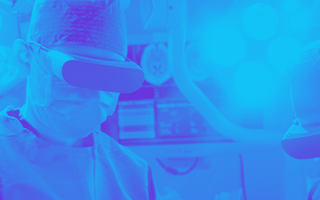
Doctors need to take a break during their busy day to swim with dolphins. Nurses should see the London Bridge. As the COVID-19 pandemic persists, physicians should experience the Portuguese seashore, Mike Castleman, executive director of federal and institutional sales at AppliedVR, believes.
“If you’re in New York right now, the hotspot for COVID, and you can’t leave the hospital, you can close your eyes and imagine that you’re in Hawaii swimming with dolphins,” Castleman said. “We can actually bring you that experience.”
The LA-based virtual reality startup recently pivoted from providing therapeutic VR to hospital patients to helping healthcare workers cope with the stress of the coronavirus. The company has partnered with Red One Medical, a Savannah-based medical sales company, to address what Castleman called a pandemic of burnout among healthcare workers in the U.S. Department of Veterans Affairs.
“You have nurses and physicians quitting, you’re having early retirement, furloughs, they’re walking away from their jobs,” Castleman told Built In. “We need to give them tools to allow them to cope, and allow them to be distracted and benefit from technology.”
The new partnership, announced Monday, represents a reaction to industry use as well as an extension of AppliedVR’s business ambitions.
Prior to the coronavirus crisis, Castleman said the headset technology was deployed across more than 200 healthcare facilities, including Walter Reed National Military Medical Center, Brooke Army Medical Center, Boston Children’s Hospital and more. Some of these hospitals were engaged in clinical trials to see if VR could help patients cope with pain, anxiety and stress. COVID-19 tabled those studies. Instead, Castleman said physicians picked up the Pico brand headsets already laying around their office during their breaks, and checked out AppliedVR’s soothing scenes.
The company has created or acquired a library of more than 20 experiences, or VR scenarios, that offer users distraction and relaxation therapy. Its technology is not yet Food and Drug Administration-approved but is sold as a wellness product, Castleman said.
“Insurances don’t pay for it today, but we ultimately see physicians prescribing this to patients to take home with them and to wear it and communicate with their nurse providers via telemedicine,” he said.
The partnership is partially focused on connecting VA caretakers with RiseVR, a product that the company initially developed in partnership with the federally funded VHA Innovation Ecosystem, a division of the VA. The product is intended to help veterans cope with chronic pain and stress and to comfort those in hospice care.
Castleman said the company’s long-term goal is to get this tech deployed across the more than 700 military treatment facilities in the United States and 175 VA medical centers across the country. Founded in 2017, the business is a product of the LA-based Cedars Sinai Accelerator healthcare innovation hub.
“The military is spending billions and billions of dollars on opioids every year,” Castleman said. “This technology is available for about $7 a day to bring hope and healing to our patient population and our healthcare workers.”




